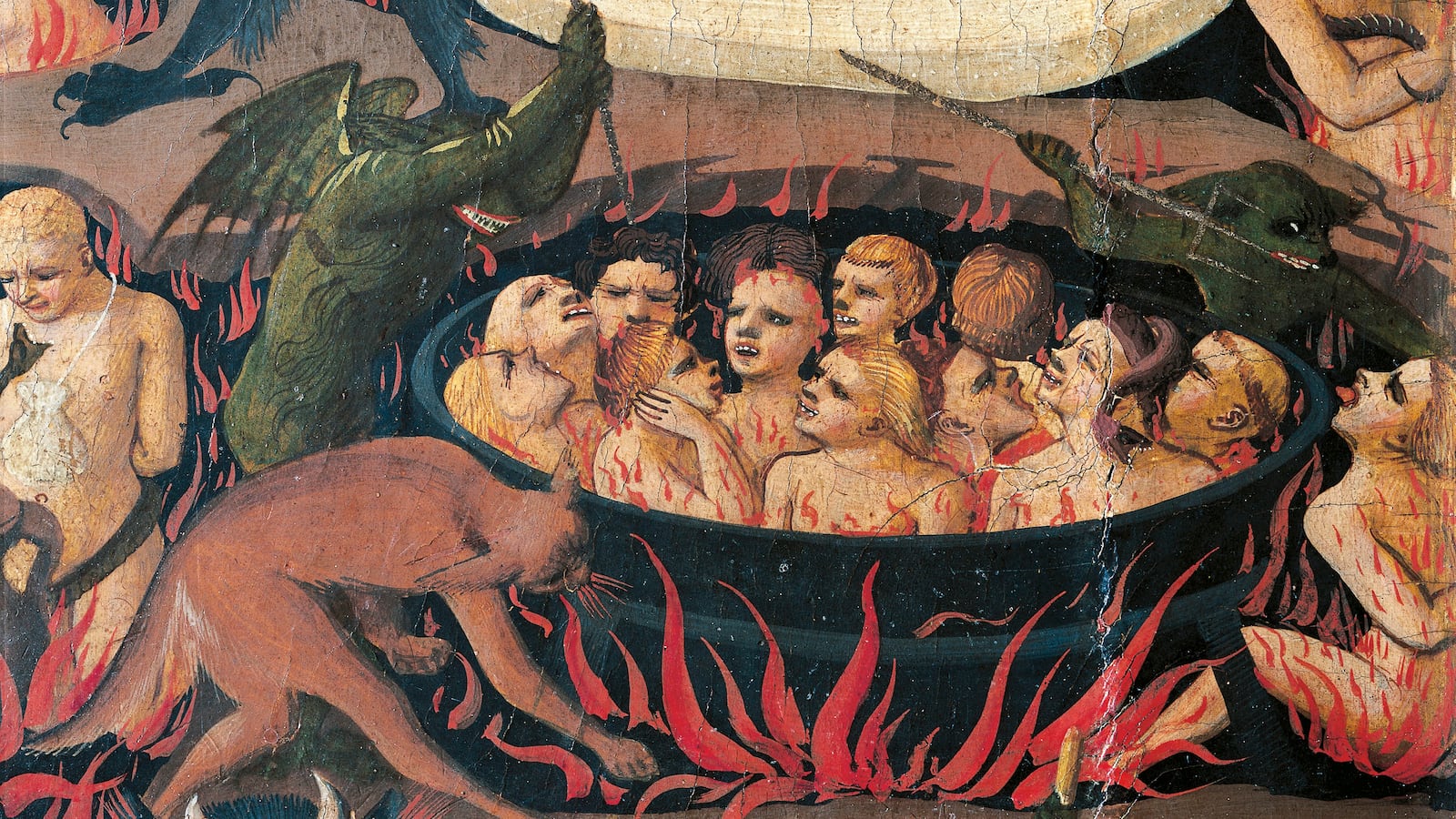Fire and brimstone has been part of Christianity for as long as there have been literal-minded Christians. Jesus himself spoke of sinners being cast into “Gehenna,” translated in the King James Bible as “hell,” the place where the “worm never dies and the fire never ceases.” Never mind that he was not referring to everlasting torment but to a desecrated valley outside of Jerusalem where the earthly remains of sinners would be unceremoniously dumped. For ancient Jews, this was a hideous prospect—not receiving proper burial rites was a fate worse than death. Only later did Jesus’ followers assume Jesus meant conscious torment forever. Later still, these followers also found the same teaching in the writings of Paul and the book of Revelation, though they too do not advance it.
Still, for most of Christian history the glories of heaven and the torments of hell captivated the Christian imagination. Relatively modern times brought widespread doubt to the population at large, but Bible-believing evangelicals famously held on, at least in their public discourse: Anyone who did not accept Jesus as their Lord and Savior would be tortured, world without end. In the extreme version, these sufferers of torment necessarily included billions of “heathen” who had never even heard of Jesus or, for some real extremists, anyone, believer or not, who had not been properly baptized as an adult.
That has begun to change. Not completely. And not for all evangelicals. But for some, including evangelical pastors, theologians, and teachers.
Most famous has been Rob Bell, the one-time evangelical superstar preacher and best-selling author of Love Wins, a book that explains how Bell’s rethinking about the doctrine of hell compelled him to leave his mega-church pulpit to roam in other, non-evangelical circles. He simply could no longer believe in a God who values vengeance more than mercy, prefers retributive justice to everlasting love, and allows, let alone sanctions, torture of his creatures for all eternity.
Yet more surprising than such evangelicals who have had the hell scared out of them and felt forced, then, to leave their communities are those who have changed their views but, rather than head elsewhere, have continued on, precisely as evangelicals. There are increasing numbers of such, who continue to hold firmly to the authoritative teachings of the Bible—even insisting that these teachings are “inerrant”—but who argue that neither Jesus nor the authors of the New Testament taught that sinners face eternal punishment.
I was recently invited to speak at a conservative evangelical “apologetics” conference. As an apostate from the evangelical cause, a de-converted atheist biblical scholar (a rare breed) this is not my normal venue. The term apologetics refers to the “reasoned defense” of the faith. Conferences like this are organized to give laypeople instruction, guidance, and assurance of the truth of their religious claims, as they are provided “proofs” that the Bible is inspired with no contradictions or mistakes, that Jesus was literally raised from the dead bodily, or that (Christian) miracles really do happen and demonstrate the reality of the Christian (and no other) God.
The other speakers at the meeting were all conservative evangelical scholars; I had been invited to present an alternative position. To my great surprise, we found some points of common ground. This would not have happened 40 years ago, when I myself was committed to evangelical apologetics.
At the time of the conference, I was writing my book Heaven and Hell: A History of the Afterlife. In the book I point out that the age-old Christian views about the afterlife continue to hold sway among the majority of Americans, not just evangelicals. According to the latest Pew poll, 72 percent of Americans (of all kinds) continue to believe in a literal heaven, and 58 percent in a literal hell. At death, a person’s soul goes to the realms above to find eternal bliss or to the pits below to for never-ending torment. One of my chief arguments in the book is that neither idea can be found in the Old Testament or in the authentic teachings of Jesus.
This seems counter-intuitive to most Christians, who naturally assume their views are set forth clearly in the Bible. But they are not. The traditional ideas of heaven and hell appeared only later in the Christian theological tradition, decades after both Jesus and Paul had passed from this world of mortals.
During some of our conference downtime I was explaining this view to a fellow-speaker, one with whom I was particularly simpatico, despite our rather pronounced religious differences. To my shock, he told me he agreed with me: Jesus didn’t believe in hell. And neither did he.
In all the years I had been a committed Bible-believing Christian I never knew an evangelical teacher, pastor, or theologian—and least of all an apologist—who would admit they did not believe in hell. Or that Jesus probably didn’t either. People like that left the faith and became Unitarians.
But these days it is happening, even if the rest of us have not fully noticed. In 2016 the conservative Christian publisher Zondervan, a founding member of the Evangelical Christian Publishers Association, published a book called Four Views on Hell. In it four evangelical theologians and philosophers discuss their understanding of eternal torment. Only one of them believes in a literal hell: a place of eternal, conscious, sentient agony for those who are not “saved,” i.e., the vast majority of the human race. The three others argue for other views: sinners will be annihilated out of existence; or that they will be allowed postmortem repentance and be forgiven; or their souls will be purified by afterlife fires and then granted admission to the heavenly realm—an evangelical take on the traditional Catholic idea of purgatory. None of these three believes in eternal, conscious torment.
The book can come as a shock. Evangelicals not believing in a literal hell? What is this?
It is the voice of reason. It is thinking, kind-hearted, and loving evangelicals declaring that God is not a monster. Committed Christians who cannot and do not believe God is interested in torturing his enemies for all time. Who do not accept the idea of a God who punishes 20 years of sin with 20 trillion years of unimaginable torment, with that barely the beginning. And who realize the Bible in fact does not teach it.
Conservative evangelicals are changing. It is not always for the good. In many ways, in our troubling times, it may seem very bad indeed. But if some evangelical thinkers are joining the rest of the world and beginning to see reason in one area—we might call it an area of ultimate concern—there is still hope, both for them and for those of us who will always live among them.






